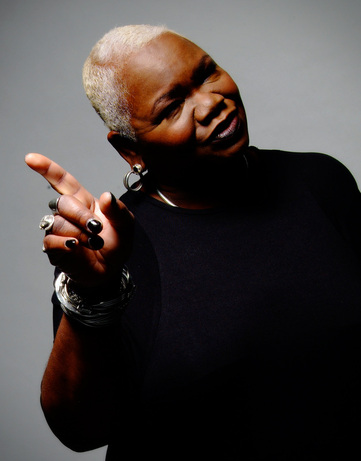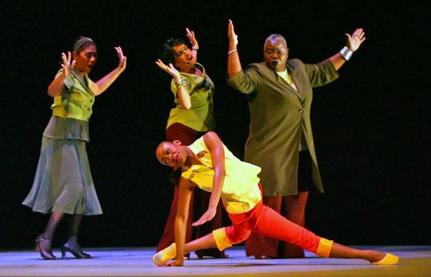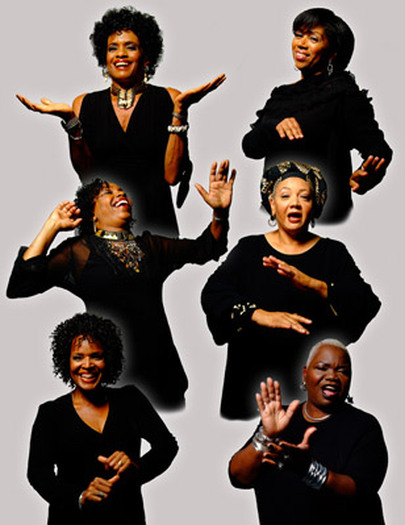Sweet Honey in the Rock: in harmony
Berkshire Eagle, 1/28/11

By Jeremy D. Goodwin
PITTSFIELD—Music is about more than good times, or even artistic expression, to Sweet Honey in the Rock. It's about bringing the community together and having a conversation. So says Dr. Ysaye M. Barnwell, a longtime member of the legendary vocal group performing tonight at the Colonial Theatre.
Sweet Honey in the Rock, a six-member, all-female ensemble concerned with social justice and the inheritance of African American musical traditions, has been making music since 1973. The heart of its aesthetic can be found in the historic role of the black church—not only in terms of musical style, but the role of music in the community.
"If you come out of an African worldview, music has always been the tool through which you have conversations. It's always been the way you document things that are going on, it's always have been the way you deal with things that are problematic and the way you look for inspiration and direction," Dr. Barnwell says in a telephone interview from Washington, D.C., where she resides.
"That happened in a bold way during the civil rights movement. There wasn't a civil rights meeting you could go to where there wasn't the music. And that music was the glue that tied together all of the diverse people in the room and on the marches. Everyone could join in on the singing," she says, before borrowing phrases from traditional spirituals that were seized upon for their application to current events. "We're not going to let anyone turn us 'round, we shall not be moved. We're looking for a positive response to our request for freedom and justice. All of that was in the music."
PITTSFIELD—Music is about more than good times, or even artistic expression, to Sweet Honey in the Rock. It's about bringing the community together and having a conversation. So says Dr. Ysaye M. Barnwell, a longtime member of the legendary vocal group performing tonight at the Colonial Theatre.
Sweet Honey in the Rock, a six-member, all-female ensemble concerned with social justice and the inheritance of African American musical traditions, has been making music since 1973. The heart of its aesthetic can be found in the historic role of the black church—not only in terms of musical style, but the role of music in the community.
"If you come out of an African worldview, music has always been the tool through which you have conversations. It's always been the way you document things that are going on, it's always have been the way you deal with things that are problematic and the way you look for inspiration and direction," Dr. Barnwell says in a telephone interview from Washington, D.C., where she resides.
"That happened in a bold way during the civil rights movement. There wasn't a civil rights meeting you could go to where there wasn't the music. And that music was the glue that tied together all of the diverse people in the room and on the marches. Everyone could join in on the singing," she says, before borrowing phrases from traditional spirituals that were seized upon for their application to current events. "We're not going to let anyone turn us 'round, we shall not be moved. We're looking for a positive response to our request for freedom and justice. All of that was in the music."

Dr. Barnwell is one of 23 women who have been members of the Grammy Award-nominated group over the years, and has been a member since 1979. In addition to receiving the key assignments of producing the group's 25th anniversary album and editing the only published collection of its original music, she has been incredibly prolific in a number of fields. A classically trained violinist from the age of two and a half, she had already earned a PhD in speech pathology and founded a Washington D.C. choir before joining Sweet Honey. (She still continued her post-doctoral studies after that, picking up a second master's degree, this one in public health.)
She's written two books for children, brought a workshop in traditional African American vocal singing to three continents, earned some acting credits (including the 1998 film "Beloved"), and received many commissions as a composer. And don't forget the more-than-ten years she taught in Howard University's School of Dentistry.
The work of Sweet Honey is largely a cappella, though additional touches like percussion or handclaps may be added as well. The musical style is rooted in African American spirituals and early gospel music, but integrates different flavors of other musical styles born from the African American experience. But the group is by no means an academic exercise. "Would You Harbor Me," for instance, sounds at first like a spiritual borrowed from the deep river of traditional music, but goes on to draw parallels between fugitive slaves of the Harriet Tubman era with people afflicted today with AIDS and Haitian refugees. Its 2010 song "Are We A Nation?" was prompted by Arizona's controversial SB-1070 immigration law.
"It has been important to me that the group really draws on traditional music. Some of it is from Africa, much of it comes out of the early spirituals and early gospel music of the United States. We not only try to preserve that as part of our repertoire, but to extend that repertoire by creating new music that has relevance to us," Dr. Barnwell explains. "We look at a number of different issues and circumstances. You may hear some rap, you may hear Latin rhythms, you may hear some jazz influence, but all of it really is informed by earlier music. For me there is a continuum from the old material into the new material."
She's written two books for children, brought a workshop in traditional African American vocal singing to three continents, earned some acting credits (including the 1998 film "Beloved"), and received many commissions as a composer. And don't forget the more-than-ten years she taught in Howard University's School of Dentistry.
The work of Sweet Honey is largely a cappella, though additional touches like percussion or handclaps may be added as well. The musical style is rooted in African American spirituals and early gospel music, but integrates different flavors of other musical styles born from the African American experience. But the group is by no means an academic exercise. "Would You Harbor Me," for instance, sounds at first like a spiritual borrowed from the deep river of traditional music, but goes on to draw parallels between fugitive slaves of the Harriet Tubman era with people afflicted today with AIDS and Haitian refugees. Its 2010 song "Are We A Nation?" was prompted by Arizona's controversial SB-1070 immigration law.
"It has been important to me that the group really draws on traditional music. Some of it is from Africa, much of it comes out of the early spirituals and early gospel music of the United States. We not only try to preserve that as part of our repertoire, but to extend that repertoire by creating new music that has relevance to us," Dr. Barnwell explains. "We look at a number of different issues and circumstances. You may hear some rap, you may hear Latin rhythms, you may hear some jazz influence, but all of it really is informed by earlier music. For me there is a continuum from the old material into the new material."

She says the goal of any Sweet Honey concert is to have “a conversation” with the audience. Each concert is programmed by a different member of the group, a practice that makes room for fresh approaches from night to night, and the ability to sometimes respond to issues of import in the community where the concert is held. Though the group indeed encourages audiences to join in from time to time, the goal is to do more than get people singing or humming along. It’s to communicate frankly about key social issues, especially topics that can be difficult to broach.
This is an approach toward music that differs from the traditional Western viewpoint that sees music as entertainment or, alternately, as art for art’s sake, Dr. Barnwell asserts.
“We as African Americans come at music from a different perspective….if you have an urgency about your survival and about freedoms and about justice, then you have a different need to use that music, to use that art to articulate what it is you're feeling, needing or wanting.”
In the end, for Sweet Honey in the Rock, the music serves many purposes.
“Singing for me is always a metaphor,” Dr. Barnwell says. “It is the act of singing, but it's a way of finding your voice and finding a way to blend your voice in some harmonious way with other people, and using that as a way of coming together and having a dialog.”
It’s a dialog the ensemble has been prompting for nearly 40 years, and that continues tonight in Pittsfield.
This is an approach toward music that differs from the traditional Western viewpoint that sees music as entertainment or, alternately, as art for art’s sake, Dr. Barnwell asserts.
“We as African Americans come at music from a different perspective….if you have an urgency about your survival and about freedoms and about justice, then you have a different need to use that music, to use that art to articulate what it is you're feeling, needing or wanting.”
In the end, for Sweet Honey in the Rock, the music serves many purposes.
“Singing for me is always a metaphor,” Dr. Barnwell says. “It is the act of singing, but it's a way of finding your voice and finding a way to blend your voice in some harmonious way with other people, and using that as a way of coming together and having a dialog.”
It’s a dialog the ensemble has been prompting for nearly 40 years, and that continues tonight in Pittsfield.
